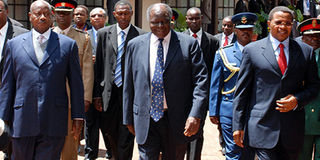Get ready for free trade in East Africa, Kikwete tells Tanzanians

Presidents Yoweri Museveni (Uganda), Mwai Kibaki (Kenya) and Jakaya Kikwete (Tanzania). Photo/FILE
President Jakaya Kikwete has told Tanzanians to get ready for the East African Customs Union whose full implementation begins in January.
Speaking in Dar es Salaam on Thursday evening, President Kikwete said this time around, there was no turning back and Tanzania manufacturers will have to compete with other EAC members – Kenya, Uganda, Burundi and Rwanda.
Under the “asymmetrical” principle, Tanzanian and Ugandan industries were shielded from Kenyan goods through tariffs but the preference ends on January 1 next year. Duty on Kenyan goods, in place since January 2005, will be lifted.
On top, a Common Market protocol paving way for freer movement of other factors of production is expected to be inked in November.
And while addressing the East African Legislative Assembly (Eala) on Friday, President Kikwete called for “patience, understanding, courtesy, empathy, civility and tolerance” from regional partners as they negotiate their way towards full regional integration.
“We are heading for major changes on the business and trade and it is better to prepare ourselves to take advantage of the situation,” said President Kikwete while addressing manufacturers at an annual gala to award best performers in the sector.
Insisting that there was no going back, President Kikwete urged businessmen and manufacturers to lay down good plans and strategies that would see them benefit from the new arrangement.
He said they should set plans that would enable then to produce high quality goods at low cost to compete with products from other EAC member states. He assured them of government support to weather the competition.
“Don’t sit back. Let me warn you that we should do away with the habit of thinking that we are not able to face others. We should stop belittling ourselves that we are not capable,” he said.
He reminded the manufacturers that when the process to re-introduce the community started, there was a lot of fear that Tanzania was going to be turned into a market to the extent that “some of us who were spearheading the process were seen as traitors.”
“But the benefits of the regional integration are now obvious. For instance, business between Kenya and Tanzania has grown and in fact Tanzania sells more to Kenya than ever before,” said Mr Kikwete noting that data from the bank of Tanzania (BoT) indicate that in 2008 Tanzania sold to Kenya goods worth Sh277,820 million while Kenya sold to Tanzania goods worth Sh233,967 million.
He said this was the result of opening the borders and reduction of trade barriers through the introduction of the EA Customs Union.
“I believe that the introduction of Common Market will benefit us more. It is time now we make preparations and set strategies. I believe we are able. If we have reached this stage, no doubt we can go all the way,” he said.
He noted: “We are heading towards an era where regional trade is increasingly playing a crucial role in economic growth of any country, so we need to increase our quality and diversity of goods to ensure a steady sustainable market in the East African region.”
The gala was hosted by Confederation of Tanzania Industries (CTI) and sponsored by NBC Bank to award manufacturers in the large, medium and small-scale categories for their adherence to national and international standards and linkage to other sectors of the economy.
“Success in the East African Common market will be a testing ground for far greater things to come like the SADC which houses trade giants like South Africa,” he said.
Tanzania involvement in the EA integration has been with suspicion. It has been blamed for using land and working rights as excuse to retarding the introduction of the anticipated common market arrangement.
Pave way
Talks to that effect are still going though it has been assured that the agreements would be signed in November this year to pave way for implementation starting in January.
In his speech at Eala, he reiterated Tanzanian’s readiness to face the challenges of the envisaged EAC Common Market.
“We believe that the collective efforts of the partner States and continued commitment to the EAC integration agenda would lead to more prosperity for the region because of the immense opportunities associated with a Common Market,” he said.
But he warned that integration process was an ongoing process with a lot of challenges ahead, many issues to negotiate, including the Common Market. He said the negotiations were a process in both statecraft and diplomacy.
Additional Reporting by Vicent Mnyanyika




